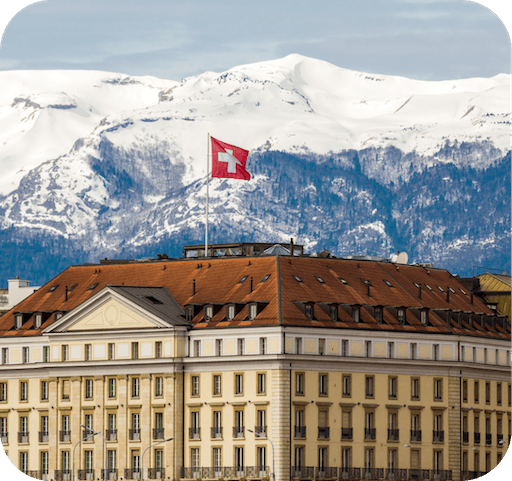Study in Switzerland
Switzerland offers world-class education in a highly secure and well-organised environment. Public universities charge relatively low tuition, academic standards are exceptionally high, and global industries value Swiss degrees for precision, quality, and research excellence.


Why Students Choose Switzerland?
Switzerland combines academic excellence, safety, and strong global career relevance.
World-Class Education:
Renowned globally for academic excellence, research quality, and precision-driven learning.Low Public Tuition:
Public universities charge relatively low tuition compared to the quality of education delivered.Global Industry Links:
Strong connections to finance, pharmaceuticals, engineering, hospitality, and innovation-driven industries.Safe & High Living Standards:
One of the safest countries globally, with excellent infrastructure and quality of life.International Exposure:
A multilingual, multicultural environment with strong global career relevance.
Intakes in Switzerland
The Swiss academic calendar is structured and predictable, but deadlines are strict, especially at public universities.
Autumn Intake (Primary)
Semester Starts: September
- Applications open: November
- Deadlines: January 15 – April 30
Scoutabroad Tip
Submit applications by January. Switzerland follows strict non-EU quotas. Early applications improve chances before international seats are capped.
Spring Intake
Semester Starts: February
- Applications open: May
- Deadlines: July – September 30
Scoutabroad Tip
Only select Master’s programmes open in Spring. Availability varies by university and should be checked early.
Top Fields of Study in Switzerland
Switzerland has strong specialisations aligned with global industries.
Engineering & Applied Sciences
Popular specializations
Mechanical Engineering, Electrical Engineering, Robotics, Systems Engineering
Computer Science & IT
Popular specializations
Artificial Intelligence, Data Science, Computer Engineering, Information Systems
Life Sciences & Biotechnology
Popular specializations
Biotechnology, Biomedical Sciences, Pharmaceutical Sciences, Life Sciences
Business, Finance & Management
Popular specializations
Finance, Economics, Banking, International Management
Hospitality & Tourism Management
Popular specializations
Hotel Management, Tourism Studies, Luxury Brand Management
Types of Universities in Switzerland – Comparison
| Category | Public Universities | Universities of Applied Sciences (UAS) | Hospitality & Luxury Schools |
|---|---|---|---|
| Tuition fee | CHF 1,000 – 2,000/year | CHF 2,000 – 4,000/year | CHF 30,000 – 45,000/year |
| Bachelor Language | German / French / Italian | German / French / Italian | English |
| Master Language | Many English programs | Many English programs | English |
| Competition | High | Medium | Medium–High |
| Ideal For | Strong academic & research profiles | Practical, applied learners | Hospitality & luxury careers |
| Scholarships | Government + University | Limited | Merit-based |
Top 5 Universities in Switzerland
Eligibility Requirements
Academic Requirements
- Public research universities generally expect 60–70% with strong subject preparation.
- Top institutions such as ETH Zurich or EPFL require higher grades and strong mathematics or technical foundations.
Language Requirements
- English-taught programmes: IELTS typically 6.0–6.5 or higher, or equivalent.
- Local-language programmes: B2–C1 proficiency in German, French, or Italian depending on the programme.
Work Experience
- Bachelor’s programmes: Rarely required.
- Master’s, business, and hospitality programmes: 1–2 years may be preferred.
Portfolio Requirements
- Design, architecture, and fine arts programmes may require portfolios, auditions, or entrance assessments.
Application Process - Simple Steps
1
Choose programme and intake
2
Shortlist universities using official portals
3
Check eligibility and language requirements
4
Take required language tests
5
Prepare SOP, CV, transcripts, LORs and passport
6
Apply through university portals
7
Arrange finances, insurance, and accommodation
8
Apply for study visa or residence permit
💡
| Category | Approximate Cost |
|---|---|
| Living Costs | ~₣2000 per month |
| Accommodation | ~₣900 per month |
| Health Insurance | ~₣300 per month |
| Transport & Utilities | ~₣160 per month |

Costs & Affordability
Part-time Jobs in Switzerland
Part-time work is allowed with conditions.
Work Rules
- Only after 6 months of study
- Maximum 15 hours per week
- Full-time work allowed during holidays only
- Local language usually required
- Part-time income does not cover full living costs

Frequently asked questions
Myths vs Reality
- Myth
- Reality
- Myth
- Reality
- Myth
- Reality
- Myth
- Reality
- Myth
- Reality
Myth
Only extremely wealthy students can study here.
Reality
Public university tuition is relatively modest. While living costs are high, it is achievable through scholarships, part-time work, and careful financial planning.
Myth
You must know the local language fluently before arriving.
Reality
Many Master’s programmes are taught in English. However, learning German, French, or Italian significantly improves your daily life and access to the job market.
Myth
It’s easy to manage expenses since tuition is low.
Reality
Students often underestimate rent, health insurance, and the high cost of living. In Switzerland, financial planning for daily life is more critical than the tuition itself.
Myth
Admission guarantees a job after graduation.
Reality
Employment outcomes are strong, but not automatic. Success depends on internships, language skills, networking, and early engagement with career services.
Myth
Private institutions are always better than public ones.
Reality
Swiss public universities are world-renowned for research and academics. Private schools are excellent for niche fields like hospitality, but higher fees don't always mean better prestige.

